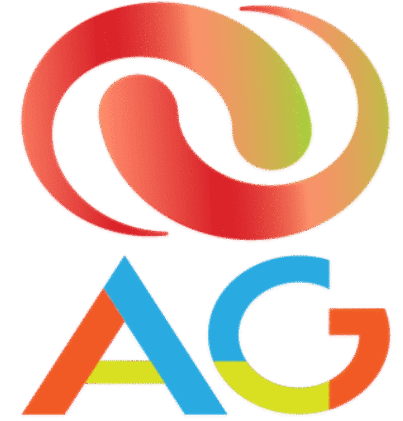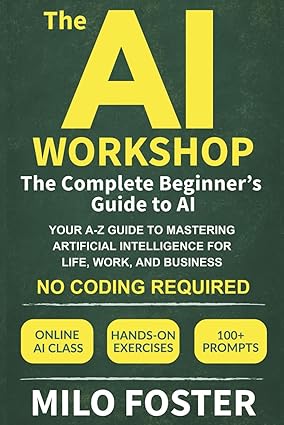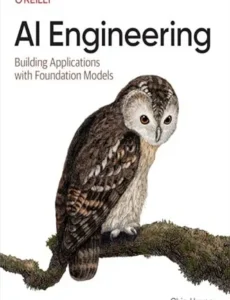By J.T. Carter
Artificial intelligence (AI) is rapidly transforming the way we live, work, and do business. Yet for many people—especially those without a technical background—AI still feels intimidating, mysterious, and out of reach. The AI Workshop: The Complete Beginner’s Guide to AI by J.T. Carter aims to change that. Positioned as a no-coding-required, A-Z guide for total beginners, this ebook strives to make AI accessible, practical, and applicable for non-technical individuals, entrepreneurs, business leaders, and curious learners.
In this review, we’ll explore what the book offers, where it shines, and where it may fall short—ultimately evaluating whether The AI Workshop delivers on its bold promise to make AI understandable and useful for everyone.
Overview
The AI Workshop is designed as an entry-level roadmap into the world of artificial intelligence. Structured in a logical, progressive manner, it introduces readers to core AI concepts, real-world applications, ethical considerations, and how to use AI tools and platforms—without requiring programming or data science skills.
The book is divided into digestible chapters that cover topics such as:
- What AI is (and isn’t)
- The difference between AI, machine learning, and deep learning
- Everyday examples of AI in use
- How businesses leverage AI for marketing, productivity, and decision-making
- Common AI tools and platforms (like ChatGPT, DALL·E, and others)
- How to evaluate AI technologies for your own needs
- Ethics, bias, and data privacy concerns
- Future trends and how to prepare for an AI-driven world
The book places a heavy emphasis on practical understanding and immediate application, focusing more on “what” and “why” than “how to code it.”
Pros
1. Genuinely Beginner-Friendly
The strongest point of The AI Workshop is how well it caters to complete newcomers. J.T. Carter avoids technical jargon and breaks down complex ideas into plain, conversational language. Definitions, examples, and metaphors are used effectively to ensure readers can grasp foundational concepts like neural networks, natural language processing (NLP), and computer vision without needing a computer science degree.
2. No Coding Required
Many AI books—even those claiming to be beginner-friendly—assume at least some familiarity with Python, algorithms, or statistics. This book is truly different: it presents AI from a conceptual, strategic, and practical point of view. That makes it a rare gem for professionals in marketing, education, healthcare, or management who want to understand and use AI tools without diving into code.
3. Clear, Actionable Examples
Rather than just theory, the book includes everyday examples of AI: from voice assistants like Alexa to AI in Netflix recommendations, automated resume screening, customer service chatbots, and tools like Canva’s AI design or GPT-powered content writing. These examples help readers connect abstract ideas to real-world scenarios, making the technology feel more accessible.
4. Useful for Business and Work
A significant portion of the book focuses on how businesses can use AI to streamline operations, improve decision-making, and gain a competitive advantage. This includes guidance on choosing AI tools for marketing automation, sales forecasting, customer segmentation, and productivity enhancement. It’s ideal for entrepreneurs, managers, and solopreneurs wanting to enhance their operations with AI-driven solutions.
5. Ethical and Social Considerations
Unlike many entry-level tech guides, The AI Workshop doesn’t ignore the darker side of AI. Carter includes thoughtful chapters on algorithmic bias, data ethics, job displacement, and the importance of responsible AI development. These sections help readers think critically, not just optimistically, about the AI revolution.
6. Up-to-Date and Platform-Specific
The book mentions recent AI breakthroughs and tools—including GPT models, image generation tools like DALL·E, and workflow automators like Zapier or Notion AI. This timely content ensures readers aren’t stuck learning outdated information, which is a common problem with books in fast-moving tech fields.
Cons
1. Surface-Level Coverage of Some Topics
While the book covers a wide range of AI-related topics, its breadth comes at the cost of depth. Some sections—like those on machine learning, AI models, or how neural networks work—are presented in oversimplified ways. Advanced readers or those curious for a deeper technical understanding may find these explanations too brief or generalized.
2. Light on Hands-On Exercises
Although the book promises to be a “workshop,” it lacks interactive exercises, worksheets, or guided activities that would deepen learning. Including step-by-step tutorials for using common AI tools (e.g., a walk-through of how to use ChatGPT to create a content calendar) could have boosted the practical value dramatically.
3. No Visual Aids
The ebook is mostly text-based, which can be a drawback for visual learners. Diagrams showing how a neural network functions, or flowcharts comparing types of AI, would make some complex ideas easier to grasp and retain.
4. Repetitiveness in Certain Chapters
At times, the book reiterates the same points—particularly the importance of mindset shift and embracing change—without adding new insight. While repetition helps reinforce key ideas, it occasionally feels like filler in an otherwise concise book.
5. Limited Industry-Specific Advice
Although the book is valuable for general AI application, it could benefit from more specific case studies or tailored advice for different industries such as education, healthcare, or real estate. Readers from niche fields may find the content too broad to directly apply to their sector.
Should You Learn from This Book?
Why You Should:
- You’re new to AI and want a jargon-free, approachable introduction.
- You’re a business owner, marketer, or manager looking to leverage AI tools without hiring a developer.
- You’re interested in how AI impacts society, jobs, and ethics—but don’t want a technical deep dive.
- You need a quick, modern, and practical overview of AI concepts and use cases.
Why You Might Not:
- You’re already familiar with AI fundamentals or want to learn how to build AI systems.
- You prefer a textbook-style guide with diagrams, graphs, or coding tutorials.
- You want in-depth analysis of machine learning algorithms, model training, or AI architecture.
Final Verdict
The AI Workshop: The Complete Beginner’s Guide to AI is an accessible, informative, and highly practical resource for anyone looking to understand artificial intelligence without the intimidation of technical complexity. J.T. Carter succeeds in making AI approachable for business leaders, entrepreneurs, students, and everyday users. While it doesn’t go deep into the mechanics of AI, it does an excellent job of explaining what AI is, how it’s being used, and how to think critically about its role in our future.
For readers seeking to harness the power of AI in their work or business—without writing a single line of code—this book is a solid place to start.
Recommended for: Non-technical professionals, curious learners, entrepreneurs, educators, and anyone looking to understand and apply AI in daily life.
Rating: ★★★★☆ (4.5 out of 5)
You can purchase it on Amazon if you like.


